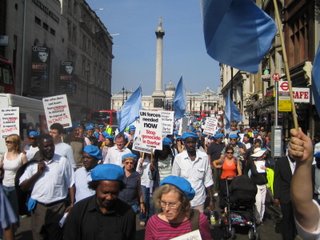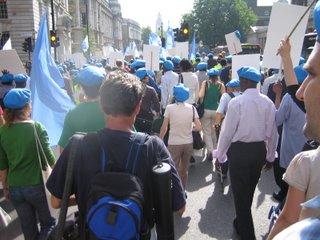Last night Oriana Fallaci, one of the most famous and cotroversial Italian journalists, passed away. Wikipedia has a comprehensive and balanced biography of her. From the introduction:
Oriana Fallaci (June 29, 1929 in Florence, Italy - September 15, 2006) was an Italian journalist, author, and political interviewer.
 (Photo source) A former antifascist partisan during World War II, she had a long and successful journalistic career.
(Photo source) A former antifascist partisan during World War II, she had a long and successful journalistic career.
[...]
As a young journalist, she interviewed many internationally known leaders and celebrities such as Henry Kissinger, the Shah of Iran, Ayatollah Khomeini, Lech Wałęsa, Willy Brandt, Zulfikar Ali Bhutto, Walter Cronkite, Omar Khadafi, Federico Fellini, Sammy Davis Jr, Deng Xiaoping, Nguyen Cao Ky, Yasir Arafat, Indira Gandhi, Alexandros Panagoulis, Archbishop Makarios III, Golda Meir, Nguyen Van Thieu, Haile Selassie and Sean Connery.
After retirement, she wrote a series of articles and books, critical of Islam and Arab culture, that have roused significant controversy.
After a decade of self-imposed silence she returned to the Italian public discourse with a long and fiery essay expressing her thoughts following the September 11th attacks on the United States. Entitled
La Rabbia e l'Orgoglio (The Rage and the Pride, translation
here) it was published by Corriere della Sera on 29 September, 2001. I remember reading it that day, at my parents' home in Milan and feeling admiration for her plain-speaking and vigorous attack on the enemies of the West, both internal and external. Her occasional lack of distinction between radical Islamists and Muslims in general, was in my view totally inappropriate, but her critics often fail to note that her vitriolic attacks are quite consistently indiscriminate: the Italian people, the EU etc. also come in for their share of criticism without any distinctions being made.
The essay was expanded into a
book which was followed by a
sequel, and she continued writing articles, never leaving the public eye.
As I noted, there are fair and serious criticisms that can be made of her rhetoric, without dishonestly minimising the threat that is in fact posed by Islamist fanatics. I certainly do not agree with all of her positions (for instance, I am absolutely in favour of
open immigration – although I believe a certain degree of integration and assimilation should be expected of newcomers).
In a relatively balanced piece for
Reason,
Cathy Young quotes a critique of Oriana's book by
Christopher Hitchens - certainly no apologist for Islamists - published in the
Atlantic Monthly:
Written in the hot flush that overtook her on September 11, and originally published as a screed in the Milan daily Corriere della Sera, this is a sort of primer in how not to write about Islam. Fallaci claims in her introduction that in order to shorten the diatribe for newspaper purposes she "set aside the most violent passages." I wonder what those passages can have been like; the residue is replete with an obsessive interest in excrement, disease, sexual mania, and insectlike reproduction, insofar as these apply to Muslims in general and to Muslim immigrants in Europe in particular. A sampling, which preserves her style and punctuation and spelling:
The fad or rather the hypocrisy, the shit, that calls "local tradition" the infibulation. I mean the bestial practice by which, in order to prevent them from enjoying sex, Moslems cut young girls' clitoris and sew up the large lips of the vulvas. All that remains is a tiny opening through which the poor creatures urinate, and imagine the torment of a defloration ... thank God I never had any sentimental or sexual or friendly rapport with an Arab man. In my opinion there is something in his brothers of faith which repels the women of good taste.
In other words—and there are a great many of them—Fallaci ignores her own pro forma injunction to remember that Islam is a faith, not a race. Her horror is for the shabby, swarthy stranger who uses the street as a bathroom (she can't stay off this subject) and eyes passing girls in a lascivious manner.
Although I think this characterisation is rather overwrought and unfair, it has some truth to it and it is this kind of thing that is the source of the mixed feelings I have towards Oriana Fallaci: on the one hand I deplore her lack of clarity on what should be legitimately attacked and what can only be termed prejudice, on the other I feel that in the West there is an intense dearth of commentators and public figures who are willing and able to defend the basic principles on which the West is based, and Oriana Fallaci's writings, despite all her flaws, have, for some people – many of whom I'm convinced are not bigots – served as a wake up call to the threat under which these principles are, and I would call that a good thing. Only a few months ago the
New Yorker published a beautiful article about her, which I think portrays her fairly, while depicting her contradictory nature.
A good exposition of the very serious problems that Europe is facing has been written by
Bruce Bawer, who - in my experience - strongly expresses the moral clarity which Oriana Fallaci partly lacked. I am currently reading his new book,
While Europe Slept, which is very interesting and well-written (also see this excellent
book by Claire Berlinski). He explores many of the themes of the book in an essay he wrote for the
Hudson Review (see
here for pdf version), which also quotes Oriana Fallaci:
The messenger [Pim Fortuyn] was silenced—but his message lived on in the writings of other heterodox Europeans who, stirred by 9/11, began to find their voices. Legendary Italian journalist Oriana Fallaci, for example, responded to 9/11 with The Rage and the Pride, a cri de coeur in which she wrote: "I am very, very, very angry. Angry with a rage which is cold, lucid, rational . . . . I spit in their face." "They" being not only the terrorists but also the European elite, which, she demanded, must shake off its fashionable anti-Americanism and anti-Semitism, recognize where the real threat to Western freedom lay, and act to defend that freedom. Civilization, America, freedom, individualism, the West: for Fallaci, all these things are indivisible, and those who defend them are heroes, those who fail to recognize their preciousness are fools, and those who seek to destroy them are a peril not to be taken lightly. In passionate, rambling, highly personal prose, Fallaci, a longtime left-winger, decried her fellow leftists' affection for Arafat, praised Rudolph Giuliani, condemned Muslims’ treatment of women, and recalled interviewing Pakistani leader Ali Bhutto, who, tearfully telling her of the marriage he was forced into as a child, concluded, "No religion is as oppressive as mine."
As Bawer writes
elsewhere for the fifth anniversary of 9/11 (emphasis mine):
On 9/11, the free world was powerfully reminded of its freedom. In Europe, alas, that day's spirit has been steamrollered by an establishment that – apparently having already accepted the inevitability of Europe's Islamization – routinely turn the truth on its head, representing aggressors as victims and self-defense as inflammatory. That upside-down picture needs to be set aright, and the spirit of 9/11 resurrected. For the bottom line is simple: if we don't cherish our liberties with the fervor that the jihadists treasure their faith, we'll lose.
And that is why Oriana Fallaci's fervor was, depite the misgivings, welcome to me.



